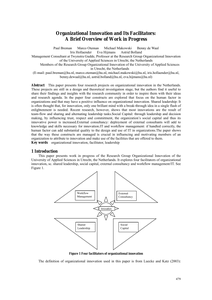Change has become continuous, and innovation is a primary approach for hospitality, i.e., hotel companies, to become or remain economically viable and sustainable. An increasing number of management researchers are paying more attention to workplace rather than technological innovation. This study investigates workplace innovation in the Dutch hotel industry, in three- and four-star hotels in the Netherlands, by comparing them to other industries. Two samples were questioned using the Workplace Innovation survey created by the Dutch Network of Social Innovation (NSI). The first was conducted in the hospitality industry, and these data were compared with data collected in a sample of other industries. Results suggest that greater strategic orientation on workplace innovation and talent development has a positive influence on four factors of organizational performance. Greater internal rates of change, the ability to self-organize, and investment in knowledge also had positive influences on three of the factors—growth in revenue, sustainability, and absenteeism. Results also suggest that the hospitality industry has lower workplace innovation than other industries. However, no recent research has assessed to what degree the hospitality industry fosters workplace innovation, especially in the Netherlands. Next to that, only few studies have examined management in the Dutch hotel industry, how workplace innovation is used there, and whether it improves practices.
DOCUMENT

This study empirically examines individual and organizational factors that influence expatriates’ cross-cultural adjustment and job performance. The study was a quantitative research from 117 Thai expatriates who work in Thai multinational companies (MNC) located in Indonesia. The results of the study indicated that financial perceived organizational support influence positively towards Thai expatriates’ overall cross-cultural adjustment in Indonesia. This study found that cross-cultural training influenced positively towards Thai expatriates’ adjustment. A causal relationship between the predicting variables of crosscultural adjustment and Thai expatriates’ job performance was not found. Results suggest important consequences for management strategies providing support to Thai expatriate employees increasing their adjustment in Indonesia. Keywords: Cross-Cultural Adjustment; Job
DOCUMENT

This paper presents four research projects on organizational innovation in the Netherlands. These projects are still in a design and theoretical investigation stage, but the authors find it useful to share their findings and insights with the research community in order to inspire them with their ideas and research agenda. In the paper four constructs are explored that focus on the human factor in organizations and that may have a positive influence on organizational innovation. Shared leadership: It is often thought that, for innovation, only one brilliant mind with a break-through idea in a single flash of enlightenment is needed. Recent research, however, shows that most innovations are the result of team-flow and sharing and alternating leadership tasks. Social Capital: through leadership and decision making, by influencing trust, respect and commitment, the organizations social capital and thus its innovative power is increased. External consultancy: deployment of external consultants will add to knowledge and skills necessary for innovation. IT and workflow management: if handled correctly, the human factor can add substantial quality to the design and use of IT in organizations. The paper shows that the way these constructs are managed is crucial in influencing and motivating members of an organization to attribute to innovation and make use of the facilities that are offered to them.
DOCUMENT
